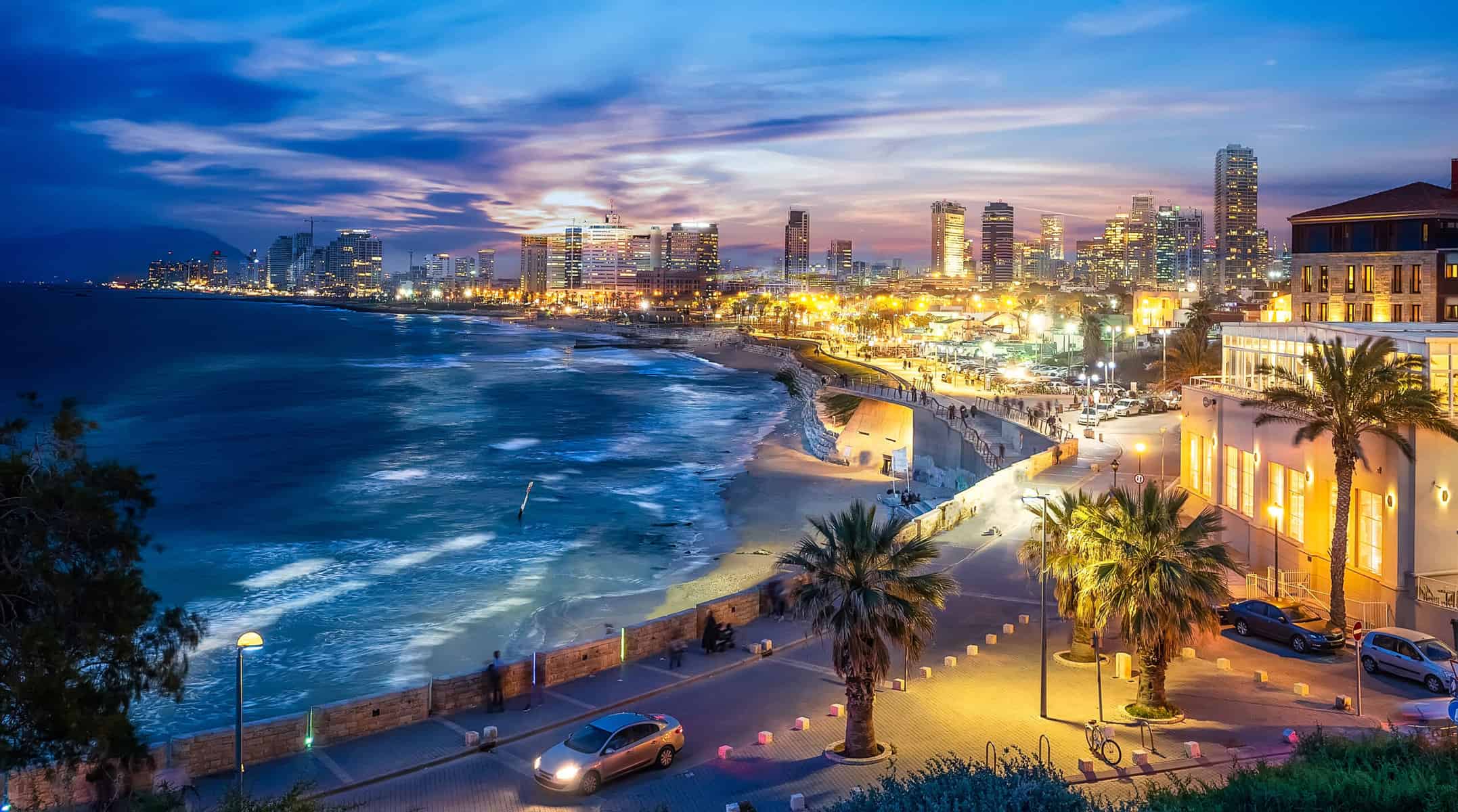I wake up in the morning, pull on shorts, slide into slippers, and leave the house without makeup. I don't feel different from the rest because nobody is judging me. In Tel Aviv, it doesn't matter what you look like or what you do. The only thing that matters is to spend time in a way that makes you happy. This city is full of freedom, tolerance, and fun. Carpe Diem! Everyone here wears slippers and tank tops, which are called "gufiya" here. It's too hot to wear anything more and judge one's social status by that. And you have to always be ready for the beach, because it's the central park of the city. That's where most of the time is spent and that's where I always go right after arriving from Warsaw to Tel Aviv. The beach faces west, so the sunset is usually spectacular – a huge red ball of sun hides behind the horizon. Every Friday, around Charles Clore park, this is accompanied by drum music. The closer to the sunset, the faster and louder it gets. It quiets down with the disappearance of the sun beyond the sea line and the beginning of Shabbat.
I have fun on the roof 😉. After sunset on Saturday, parties start. The best ones are the "illegal" ones on the roofs of buildings. To find them you need to walk along Rothschild Boulevard, somewhere about halfway, on a Saturday evening, and listen to where the music is coming from. If you see a line in front of one of the buildings, definitely join it. The best music and the cheapest alcohol in the city are on the roofs. You don't pay for entry, you just chip in for the DJ.
I also like the Teder.fm club, where you can listen to contemporary Israeli music, mainly hip-hop and electronic music. Hadag Nahash is my favorite band. The name means snake-fish and that's what it sounds like ))) – the guys are very multi-instrumental. Actually, all the city residents I've met so far play some instrument. Musicality is ubiquitous here.
In Tel Aviv, you can also watch the best dance theatre in the world, the Batsheva Dance Company. They're not always around because they travel a lot, but if you get the chance, you must take it. If you're fascinated by culture and art, be sure to visit the Florentin district, where you'll find many small galleries, vintage clothing stores, and cafes with a nice atmosphere. It's a place full of energy, where you can meet many artists and people associated with culture. If you're interested in traditions and history, be sure to see Jaffa - the oldest part of the city, full of narrow streets, colorful tenements, and monuments. There you'll also find many Israeli restaurants serving classic Israeli dishes (but not necessarily Jewish restaurants).
I shop at the bazaar. Bazar in Hebrew is shuk. I have my favorite little shops. In one I buy fruit, in another bread. There can be about twenty of such small stores on one street, and each will have its loyal customers. However, the greatest pleasure is shopping at the shuk. My favorite is Shuk Ha’Carmel in the city center. Some say it stinks. I don't understand that at all. That's how Tel Aviv smells to me – sea, exhaust fumes, spices, fresh mint, sun-heated bodies, and rotten goods, because it's hot and everything spoils quickly. And a strong aroma of coffee. Shuk Carmel is the most popular, with a lot of tourists, so if you're looking for something more intimate, Levinsky and its multicultural surroundings would be a better choice. That's where the Falasha, or Ethiopian black Jews, live, and there are many Russian shops where you can buy fantastic African clothes. Warm hummus, yes! Near Shuk Ha’Carmel is the Yemeni district. It is full of ethnic eateries that are only open at lunchtime. I like to go there for lunch and eat hummus with various vegetable additions. I also have my favorite place on Pinsker Street for musabaha, or warm hummus. I once took my chefs from Warsaw with me so that we could collectively figure out the phenomenon of its taste. It's a wonderful combination of hot chickpea paste with vegetable broth. I have not eaten anything better and equally cheap.
Warm hummus, yes! Near Shuk Ha’Carmel is the Yemeni district. It is full of ethnic eateries that are only open at lunchtime. I like to go there for lunch and eat hummus with various vegetable additions. I also have my favorite place on Pinsker Street for musabaha, or warm hummus. I once took my chefs from Warsaw with me so that we could collectively figure out the phenomenon of its taste. It's a wonderful combination of hot chickpea paste with vegetable broth. I have not eaten anything better and equally cheap.
If you don't want to spend a fortune, dine at shuk or choose places where locals sit. A street falafel costs up to 20 shekels. Restaurants are two and a half times more expensive than in Poland. Tel Aviv is the capital of street food. Jews came to it from all over the world, hence its culinary diversity. You can choose between a Yemeni pancake, burekas, Ethiopian soups or Indian cuisine. People eat in the street because almost no one cooks at home. The kitchens in the apartments are too small and do not have exhaust hoods.
The directness of Tel Aviv residents can be shocking. Men do not whistle at women, as in many Middle Eastern countries. No, no, no! But they can come up and ask if you want coffee. Girls rather do not approach strangers, but establishing a relationship with another person is very easy, especially since everyone has time for it. No one is in a hurry, moments are appreciated. I don't know when Tel Aviv residents go to work and where they get their money from, but they certainly like to spend what they earn. What matters is here and now.
Tel Aviv is a very rainbow city, the most rainbow in all of Israel, completely different from conservative Jerusalem. There used to be only one gay club there, which, under pressure from Orthodox circles, was closed. Compared to Jerusalem, Tel Aviv is sheer Sodom and Gomorrah. Israel recognizes gay marriages, has legalized partnerships, and has a liberal approach to adopting children by alternative families. I know some in which four parents are raising children. What are these differences due to? Tel Aviv is a very young city founded by intellectual elites fleeing from Europe before Nazism, a group of educated people with the means to arrange the world their own way. It's no coincidence that you can find such a flowering of modernism as the White City here. Today it is the largest collection of Bauhaus architecture in the world, inscribed on the UNESCO World Heritage List. The space designed by the anti-conservative movement in architecture certainly played a role in creating the city. Since then, Tel Aviv attracts liberal and anti-religious circles. Today, the trend here is to contest possession.
For the average Tel Aviv resident, it's no problem to pack a backpack and set off. Jews have it in their blood, after all, they never had their own state and for two thousand years they were wanderers. Young people vent their mandatory military service by traveling, after which they retain a hardness and a certain paranoia that they are surrounded by enemies. They set off into the world to find themselves. All my friends are on some path of spiritual development. And that is very inspiring.
Patents for cheap travel
Popular Israeli chain stores, like AM/PM or Superjuda, are expensive. It's better to shop at markets. This is the Middle East, so bargaining is a must, or you may overpay. I once bought spices for a horrendous amount. Now, I always ask for the price. Fruits, vegetables and fresh herbs are usually cheap though. Three shekels for a bunch of fresh cilantro. Dairy products are a bit more expensive than ours, bread is similarly priced. Alcohol - locals drink arak, an anise distillate. In a restaurant it costs about 40 PLN, in a store 10 shekels, and in bars 20. It's best to buy a beer in a store and go to the beach. That's what everyone does.
Budget airlines fly to Tel Aviv, tickets can be purchased at an affordable price, but also check the Warsaw-Tel Aviv connections in LOT. I recently bought for much less.
Important: do not arrive on Friday or Saturday, because it's Shabbat and public transportation doesn't work. Your only salvation would be taxis, and you'd have to spend about 150 shekels on them. It's better to avoid them, as they are expensive, and arrive on other days of the week. The train journey from the airport to the city takes about 15 minutes, and a ticket costs about 15 shekels.
Transportation - a single bus ticket costs 6 shekels and you can go as far as you want. However, first you need to buy a Rav Kav card and top it up. You can do this at any train station, best right after arrival. All the inscriptions are in English, it's easy to understand everything. The only difficulty is at the bus stops, as there may be 10 of them next to each other, so you have to meticulously check their numbers. You can also get around by bike or city scooter, which is becoming increasingly popular in Israel. In Tel Aviv, there are many bike and scooter stations where you can rent a vehicle for a small fee. However, be careful with the traffic, as drivers do not always follow the rules.
Money - you can buy shekels in Poland. It's not worth exchanging money on the spot or withdrawing it from an ATM, as you then pay high fees. Accommodation - it should be in the center, because it's the easiest to get around. When it's Shabbat, only a few private buses operate. Besides, it's a waste of time to travel. Better to look for a place in the center.
Accommodation - hotels in Tel Aviv are quite expensive, especially in the summer season. It's better to look for accommodation in a hostel or an apartment. You can find many offers for short-term apartment rentals online, which may be more cost-effective than a hotel. It's also worth looking for accommodation outside the city center, where prices are lower.
Food - as I already mentioned, Tel Aviv is a paradise for street food lovers. Eating on the street is cheap and delicious. You can also eat in one of the many eateries, where they serve traditional Israeli dishes: hummus, falafel, shakshuka and sabich, which is pita with vegetables and an egg. It's best to go where the locals sit, because that's where the food is the best and most authentic.
BIO
Malka Kafka - psychologist by education, Jewish by origin, restaurateur by passion. Founder of the Tel Aviv Urban Food chain of vegan restaurants.
Wysłuchała: Basia Starecka


